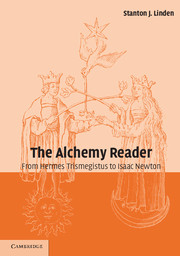Book contents
- Frontmatter
- Contents
- List of illustrations
- Acknowledgments
- List of abbreviations
- Illustrations
- Introduction
- Part I Ancient texts
- 1 HERMES TRISMEGISTUS: The Emerald Table (Tabula Smaragdina)
- 2 PLATO (c. 427-347 BC): From the Timaeus
- 3 ARISTOTLE (384-322 BC): From the Meteorology
- 4 PSEUDO-DEMOCRITUS (first or second century AD): From The Treatise of Democritus On Things Natural and Mystical
- 5 ANONYMOUS (first or second century AD): Dialogue of Cleopatra and the Philosophers
- 6 ANONYMOUS (late third century AD): From Leyden Papyrus X and the Stockholm Papyrus
- 7 ZOSIMOS OF PANOPOLIS (fl. c. 300 AD): Of Virtue, Lessons 1–3
- 8 STEPHANOS OF ALEXANDRIA (first half of seventh century AD): From The Great and Sacred Art of the Making of Gold
- 9 ANONYMOUS (eighth or ninth century AD): The Poem of the Philosopher Theophrastos Upon the Sacred Art
- Part II Islamic and medieval texts
- Part III Renaissance and seventeenth-century texts
- Glossary
- Bibliography
- Index
4 - PSEUDO-DEMOCRITUS (first or second century AD): From The Treatise of Democritus On Things Natural and Mystical
Published online by Cambridge University Press: 05 October 2014
- Frontmatter
- Contents
- List of illustrations
- Acknowledgments
- List of abbreviations
- Illustrations
- Introduction
- Part I Ancient texts
- 1 HERMES TRISMEGISTUS: The Emerald Table (Tabula Smaragdina)
- 2 PLATO (c. 427-347 BC): From the Timaeus
- 3 ARISTOTLE (384-322 BC): From the Meteorology
- 4 PSEUDO-DEMOCRITUS (first or second century AD): From The Treatise of Democritus On Things Natural and Mystical
- 5 ANONYMOUS (first or second century AD): Dialogue of Cleopatra and the Philosophers
- 6 ANONYMOUS (late third century AD): From Leyden Papyrus X and the Stockholm Papyrus
- 7 ZOSIMOS OF PANOPOLIS (fl. c. 300 AD): Of Virtue, Lessons 1–3
- 8 STEPHANOS OF ALEXANDRIA (first half of seventh century AD): From The Great and Sacred Art of the Making of Gold
- 9 ANONYMOUS (eighth or ninth century AD): The Poem of the Philosopher Theophrastos Upon the Sacred Art
- Part II Islamic and medieval texts
- Part III Renaissance and seventeenth-century texts
- Glossary
- Bibliography
- Index
Summary
Robert Steele, its translator, asserts that On Things Natural and Mystical is the “earliest known chemical treatise” (88); however, its date of composition and authorship remain highly uncertain. He attributes this work to followers of Democritus of Abdera (ca. 460-357 BC), the Greek philosopher best known for his atomistic theories, stating that it dates “certainly not later than the first centuries” AD. Matters of authorship and time of composition are complicated by the fact that pseudo-Democritean writings proliferated in the ancient world, as in the case of the Egyptian Bolos of Mendes (or Bolos the Democritean) who seems to have flourished ca. 200 BC and is known to have collected chemical and metallurgical recipes of the sort included in the present treatise. However, during this time, Democritus's reputation was not only that of a philosopher and scientist; in Pliny's Natural History (bk. 30:1), for example, he is deplored as a pupil of Ostanes and popularizer of magic: “Democritus especially instilled into men's minds the sweets of magic” (Loeb edn., 8:285). Thus, attribution of On Things Natural and Mystical to him is at least plausible and may even be correct. In any case, the variety of recipes and formulae included is great, as is the range of experimental procedures described. One finds glimmerings of “proto-scientific” methodology – as in statements of objectives, technical vocabulary, close attention to the appearances of substances, and concern with practical (if sometimes deceptive) outcomes – along with frequent and enthusiastic rhapsodies on the power and glory of Nature.
- Type
- Chapter
- Information
- The Alchemy ReaderFrom Hermes Trismegistus to Isaac Newton, pp. 38 - 43Publisher: Cambridge University PressPrint publication year: 2003
- 1
- Cited by



